
THE VOICE OF INTERNATIONAL LITHUANIA
|
VilNews has its own Google archive! Type a word in the above search box to find any article.
You can also follow us on Facebook. We have two different pages. Click to open and join.
|
Author Archive
- Posted by - (0) Comment

The Guardian:
This is a European suicide pact
In normal times in the EU, coordinated austerity would lower member states' debt. But instead it's making things worse
In the aftermath of the 2008 financial crisis practically all European Union countries opted for the same strategy to put their finances back on track: cut spending; increase taxes; reduce deficits. Research published by economic thinktank NIESR this week makes the first attempt (to our knowledge) to estimate the impact of this coordinated fiscal consolidation across the EU. What we have found won't make for pleasant reading in the treasuries of European governments.
In "normal times" fiscal consolidation would lead to a fall in debt-to-GDP ratios, but in the current circumstances it is likely to be self-defeating for the EU collectively. As a result of the deficit cutting plans now in train, debt ratios will be higher in 2013 in the EU as a whole, rather than lower. This will also be true in almost all the individual states (with the exception of Ireland). Coordinated austerity in a depression is self-defeating. The implication is that the strategy being pursued by individual members, as well as the EU as a whole, is making matters worse.
Read more…
- Bookmark :
- Digg
- del.icio.us
- Stumbleupon
- Redit it
- Posted by - (0) Comment
President Dalia Grybauskaite:
Labour Party
cannot participate
in new government
Lithuania's President Dalia Grybauskaitė has today stated that the Labour Party cannot participate in the forming of the new government.
- Bookmark :
- Digg
- del.icio.us
- Stumbleupon
- Redit it
Agree to form next government
- Posted by - (0) Comment

The leaders of three opposition parties agreed to form a ruling coalition following a meeting at one of Vilnius hotels after the Seimas election results emerged yesterday. The Social Democrats will nominate the prime minister. The announcement was made by Algirdas Butkevičius, leader of the Social Democratic Party of Lithuania, Viktor Uspaskich, leader of the Labour Party, and Rolandas Paksas, leader of the Order and Justice Party.
Photo: Irmantas Gelūnas/15 min
Leaders of Lithuania's three opposition parties agreed to form a ruling coalition following a meeting at one of Vilnius hotels after the Seimas election results emerged. The Social Democrats will nominate the prime minister.
The announcement was made by Algirdas Butkevičius, leader of the Social Democratic Party of Lithuania, Viktor Uspaskich, leader of the Labour Party, and Rolandas Paksas, leader of the Order and Justice Party.
"We have agreed to form a three-party coalition. We have agreed that a representative of the Social Democratic Party will be the prime minister. We have agreed to start drafting a government programme. A working group will be set up by the three parties, and we'll start reviewing the next year's draft budget next week," Butkevičius said.
- Bookmark :
- Digg
- del.icio.us
- Stumbleupon
- Redit it
- Posted by - (0) Comment
Lithuanian elections
Yes to stability,
no to austerity
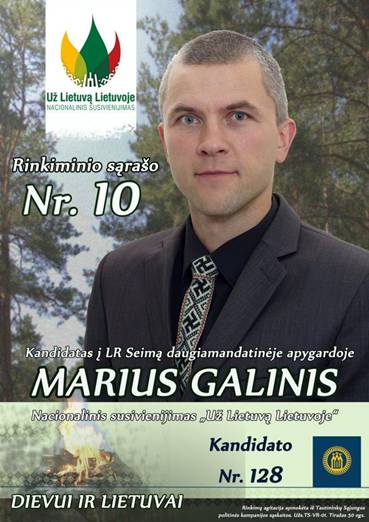
As a relief to many liberal-minded people and human rights activists came the news that Lithuanian voters completely trashed ultra-nationalist parties. The National Alliance “For Lithuania in Lithuania” (whatever that means) tried its best to mobilize the most primitive ethnic hatred, although even a classical antisemitic cartoon they distributed was about economy (the incumbent government's work in returning religious property of Jewish communities, that was nationalized under the Soviet rule). PHOTO: Marius Galinis of the „Union For Lithuania in Lithuania.“ (Lithuanian „Nacionalinis susivienijimas ‘Už Lietuvą Lietuvoje’“)
By Daiva Repečkaitė
The complicated electoral system in Lithuania makes general elections an exciting show. After the first round, when multi-constituency votes were counted, the victory of the populist Labor Party looked clear. However, after the second round (half of the Members of the Parliament are elected in single-seat constituencies), voters brought the traditional rivals, the Social Democrats and the Conservatives, ahead of the populist party. Despite the initial panic and hasty criticism of the election outcomes as a victory of populist and pro-Russian forces, the election brought unprecedented gain to traditional parties and strengthened the forces with consistent ideologies. It is also time to understand that economy in Lithuania comes before relations with Russia.
- Bookmark :
- Digg
- del.icio.us
- Stumbleupon
- Redit it
- Posted by - (5) Comment
Lithuanian elections
Yes to stability,
no to austerity

As a relief to many liberal-minded people and human rights activists came the news that Lithuanian voters completely trashed ultra-nationalist parties. The National Alliance “For Lithuania in Lithuania” (whatever that means) tried its best to mobilize the most primitive ethnic hatred, although even a classical antisemitic cartoon they distributed was about economy (the incumbent government's work in returning religious property of Jewish communities, that was nationalized under the Soviet rule). PHOTO: Marius Galinis of the „Union For Lithuania in Lithuania.“ (Lithuanian „Nacionalinis susivienijimas ‘Už Lietuvą Lietuvoje’“)
By Daiva Repečkaitė
The complicated electoral system in Lithuania makes general elections an exciting show. After the first round, when multi-constituency votes were counted, the victory of the populist Labor Party looked clear. However, after the second round (half of the Members of the Parliament are elected in single-seat constituencies), voters brought the traditional rivals, the Social Democrats and the Conservatives, ahead of the populist party. Despite the initial panic and hasty criticism of the election outcomes as a victory of populist and pro-Russian forces, the election brought unprecedented gain to traditional parties and strengthened the forces with consistent ideologies. It is also time to understand that economy in Lithuania comes before relations with Russia.
In fact, this election was a real celebration of stability, nothing like 2004, when voters flocked to newly established parties. Political parties mentioned ideologies, even the terms 'left' and 'right' more than ever. Parties dropped names that sounded like toasts (“For work for Lithuania”, 2004) or vague and generic (“National revival”, 2008). Those which chose vague and indistinguishable names (“Yes”, “Party of the Lithuanian People”) were mercilessly rejected by the voters. One-person's-show parties of very rich businesspeople managed to attract only a few thousands of votes: appeals to 'Aryan heritage' and 'pagan shield' did not help the Party of the Lithuanian People, and memory of the late President Algirdas Brazauskas did not help his second wife Kristina Brazauskienė and her the Democratic Party of Labor and Unity. Obscure Republican and Emigrant parties did not enjoy popularity either.
As a relief to many liberal-minded people and human rights activists came the news that Lithuanian voters completely trashed ultra-nationalist parties. The National Alliance “For Lithuania in Lithuania” (whatever that means) tried its best to mobilize the most primitive ethnic hatred, although even a classical antisemitic cartoon they distributed was about economy (the incumbent government's work in returning religious property of Jewish communities, that was nationalized under the Soviet rule). Stickers were glued to just about every tree on the main streets of Vilnius. Quite surprisingly, the marginal, but in the past faithfully leftist Social Democratic Union (not to be confused with the Social Democratic Party) joined this Alliance. This way Lithuania lost a political group that was consistently promoting left-wing ideas: strong trade unions and redistribution of wealth. These principles may still be there on one form or another, but leftist voters will never again be convinced that this party stands for them. The election did not bring any success for the nationalist 'Young Lithuania', which went in alliance with the far-right nationalists in the last election.
When we look at the parties that got at least 1%, but less than 5%, necessary to win seats in the Parliament, we see parties with a stronger political backbone, but still marginal. The Socialist People's Front, which advocates for nationalization of strategically important enterprises, and the Christian Party, led by a former Conservative politician, were the last among them. Interestingly, voters also grew tired of the tricks of the current mayor of Vilnius, Artūras Zuokas. He became world-famous when he staged an extreme 'punishment' with a tank for illegal parking. The Segway-riding mayor is still popular among some urban youngsters, but people also remember the allegations of shameless corruption, protectionism and abuse of power against him. With the loss of the charismatic, yet dictatorial mayor, his former 'home', the Liberal and Centrist Union, lost its electoral base and also failed to pass the threshold.
The elections were also not successful for the newly formed Union of Farmers and Greens. With several green activists on board, the party, which lost its leader to a sudden illness, rebranded itself and drafted a progressive left-leaning platform, but even its strong stance against the nuclear power plant did not attract enough voters and only succeeded in a single-seat constituency.
The smallest party to get on board is the Lithuanian Polish Electoral Action – a conservative, ultra-religious political group that has a strong base in the Polish-speaking areas of Lithuania. The mobilized ethnic minority, regularly angered by pressure for more integration and by the name transcription policy, this year absorbed a Russian minority party. They will be important in the coalitions that will be formed. Next to it came two populist parties: the impeached former president's Order and Justice Party and the new movement-turned-party “The Way of Courage”. The two were clear competitors for very disappointed, less educated and very angry voters. While many people are worried about the prospect of the latter being in the parliament, the capacity of this party's members to engage in actual day-to-day politics is likely to be limited, and they will probably follow more experienced colleagues. The split in populist voting is overall good news.
Three of the four winning parties could almost form a base of a Scandinavian-style party system. As the old leadership is receding, traditional parties increasingly compensate the lack of charismatic leaders with clear, European ideologies. The Social Democratic Party, having lost its long-time leader Mr. Brazauskas, has been searching for a new identity by purifying its ideological statements and supporting progressive taxation and more welfare spending, like social democrats traditionally should. After the split of the liberals, the Liberal Movement has been a consistent free-market ideology defender and as such made gains in the previous election and was an important partner in the current government. This year they strengthened their electoral base and, importantly, attracted youth votes becoming the only political party that that supports legalization of homosexual partnership. Finally, the Conservatives achieved what seemed to be impossible in Lithuania, where many Political Science articles have been written about 'revenge votes'. The approval ratings of the current Prime Minister – the only one who has survived the entire term of the Parliament – did not suffer as much from his austerity policy as expected. The people who were most affected were split among different political parties or have emigrated. Finally, the Labor party has become an established part of the Lithuanian political system since 2004, when it held several ministries in two successive governments. Throughout the years, its ideology did not become clearer: its platform rests on a paternalistic, caretaker stance, but, unsurprisingly, without any commitment to redistribute wealth from the rich. Its carelessness regarding budget deficit has already put them on the black list of the Lithuanian President.
For this reason the outcome of the election is not to be called a victory of the left, as many claim. We are still to see what becomes of the Lithuanian left. The votes for populists and social democrats, particularly in rural and poorer areas, clearly imply that people are tired of austerity. The Conservative-led government was good with numbers, but bad with people. They managed to control inflation, put economic growth on track and avoid accepting the invasive loan and reform package from the IMF. Yet most of the decisions were miserably communicated and harmed the poorest members of the society. To compensate this lack of concern with people and the fact that hostility towards Russia is not sufficient to mobilize voters, the Conservatives threw around religious and traditionalist statements, and failed to react to radical nationalist trends. On the other hand, they strengthened their electoral base among urban youth that self-identifies as right-wing and who appreciate governments being good with numbers, since they will not suffer from austerity measures that made the lives of the poorest members of the society more miserable. The new government may be better at addressing this problem, but dealing with numbers is likely to be its weak point. Borrowing or taxing – populists clearly never think about that when developing their promises.
- Bookmark :
- Digg
- del.icio.us
- Stumbleupon
- Redit it
- Posted by - (0) Comment

Lithuanians
in the World
VilNews will from time to time present Lithuanians who have left the home country and made some kind of career abroad. We are this time not so much looking for celebrity articles, more for some unusual life stories describing Lithuanians who have settled somewhere in the world. Send us your story!Bernard M Terway, Texas
I am proud of my
Lithuanian heritage

Lithuania, beer in a tube, me with a glass and a smile.
What more could you want?
Bernard M Terway (Tirva), Leander, Texas
Lithuanians left their home country starting in the 1800’s and, new waves keep coming to the United States all the time. My grandparents were among the “first wave” immigrants, leaving Lithuania for a better life in America, getting away from being conscripted into the Russian army, living under Russian rule, and for economic reasons.
It is still a mystery to me where they came from, where they entered the United States, but their life story begins in Pennsylvania. That, is not, however, the reason for this story.
I was born in 1940, the last of seven children, six boys and one girl. We all were baptized in the local Lithuanian church, where we attended mass on Sundays and Holy Days. I, along with two of my older siblings, went to the Lithuanian elementary school where we were taught by the Sisters of St. Casimir.
There was an attempt to teach us Lithuanian. Most of us were born at the beginnings of the Second World War, and speaking a foreign language was probably not the best way to get by at that time. I do remember the books we had to learn from, not very sophisticated, but then again, they were not meant to be. What I do not remember is being taught about Lithuania.
- Bookmark :
- Digg
- del.icio.us
- Stumbleupon
- Redit it
- Posted by - (3) Comment
Bernard M Terway, Texas
I am proud of my
Lithuanian heritage

Lithuania, beer in a tube, me with a glass and a smile.
What more could you want?
Bernard M Terway (Tirva), Leander, Texas
Lithuanians left their home country starting in the 1800’s and, new waves keep coming to the United States all the time. My grandparents were among the “first wave” immigrants, leaving Lithuania for a better life in America, getting away from being conscripted into the Russian army, living under Russian rule, and for economic reasons.
It is still a mystery to me where they came from, where they entered the United States, but their life story begins in Pennsylvania. That, is not, however, the reason for this story.
I was born in 1940, the last of seven children, six boys and one girl. We all were baptized in the local Lithuanian church, where we attended mass on Sundays and Holy Days. I, along with two of my older siblings, went to the Lithuanian elementary school where we were taught by the Sisters of St. Casimir.
There was an attempt to teach us Lithuanian. Most of us were born at the beginnings of the Second World War, and speaking a foreign language was probably not the best way to get by at that time. I do remember the books we had to learn from, not very sophisticated, but then again, they were not meant to be. What I do not remember is being taught about Lithuania.
As a young boy, I remember going to the attic in our house and finding Marian magazines that had a lot about Lithuanian history in them. They fascinated me. I went to the local library and found one book on Lithuanian history, which I read several times. I was proud of my heritage and showed it as much as I could.
Throughout my life, I always found a way to mention the fact that my heritage was Lithuanian. When I went to Penn State for graduate work, I found Dr. William Schmalstieg there. He was putting together a class on the Lithuanian language and I talked several of my classmates into taking it. It was a great class, and, because of it, I was given a scholarship to study Baltic linguistics at Fordham University for a summer. There I met Dr. Senn and Dr. Salys, two figures of importance to Lithuanian linguistics study. Unfortunately, it was only one summer and then I had to head on out into the world to make a living.
I did find another Lithuanian linguistics class at the Johann Wolfgang Goethe Institute in Frankfurt Germany, but, again, only a short introductory class.
After leaving Germany and coming back to the States in 1976, I got involved with a group of Lithuanians and with them we formed the Anthracite council of the Knights of Lithuania – Council 144, still in existence today. I became active with them until moving to Texas in 1979.
Texas is not known for its cultural diversity, unless it is Spanish or German. However, at the beginning of the end of the Soviet Union, letters to the editor in the Houston Chronicle started to appear about Lithuania. Lithuanians appeared on the local TV stations and from that, we got together to form a Lithuanian group in Houston – Lithuanian American Community of Houston. I was active with them for a number of years, until 2004, when I moved to Austin. So far I have not been able to connect with any Lithuanians here, but have not given up hope.
I am a retired teacher – I taught ESL, German, History, computer maintenance and networking. I all my classes, I made sure that the students knew something about the country of my ancestors.
No matter whether you were born there, never lived there, do not speak the language, you are still a Lithuanian and can be proud of it and teach others about it. I did, and I am proud of my heritage.

Making Lithuanian sausage - me and my mom.
Oh it was SO GOOD

Believe it or not, that is I
- Bookmark :
- Digg
- del.icio.us
- Stumbleupon
- Redit it
- Posted by - (0) Comment
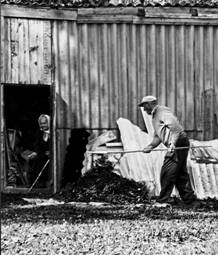
Is today’s Lithuanian youth having too good a life?
- They are so cute! Generally speaking Lithuanians are hard workers!!! I only hope this strong work ethic can be carried on in future generations...so far that doesn't seem to be the case! :-( The youth have it too good!
- My answer to Carol was that youth in Lithuania does not have a good or easy life. Most of them, at least. The government's dramatic cuts during the financial crisis have hit hard, and therefore we see that large flows of young people are escaping from the country. There is also a significant increase in the number of young people living below the poverty line, while youth crime, trafficking, smuggling, and violence continues to increase in scope. In many ways perhaps the older couple in the picture had a better, simpler adolescence...
WHAT DO YOU THINK?
Read more, see Nellie Vin’s photos
- Bookmark :
- Digg
- del.icio.us
- Stumbleupon
- Redit it
- Posted by - (0) Comment

Chevron buys shale gas exploration company in Lithuania, VZ says
Chevron Corp. (CVX) bought a 50 percent stake in LL Investicijos, which owns a license for shale gas and oil exploration in Lithuania, Verslo Zinios reported, without citing anyone.
Total investment in the exploration for oil and gas in Lithuania may be as much as $250 million, the Vilnius-based newspaper said, citing Energy Minister Arvydas Sekmokas.
Read more…
- Bookmark :
- Digg
- del.icio.us
- Stumbleupon
- Redit it
Viktor Uspaskich – who’s behind the mask?
- Posted by - (0) Comment
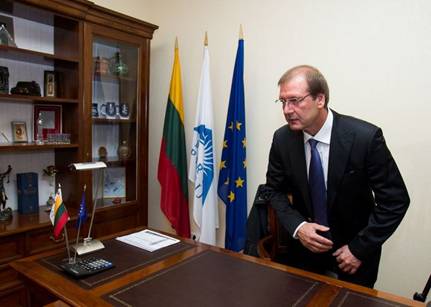
Photo: Irmantas Gelūnas/15 min
Less than ten years have passed since Lithuanian media seriously started to tell us about Viktor Uspaskich, the Russian who moved to Lithuania in the late 1980s to work as a welder, later becoming a successful businessman and politician. We learned about a businessman who paid wages to his employees as cash in envelopes, we heard that he was Gazprom's long arm into Lithuania and that big dollar amounts were smuggled from Moscow via Riga to Lithuania to bribe institutions and voters to help build up the political party he was in the process of establishing, a party which in 2004 led him right to the top in that year's parliamentary elections.
We heard that he was a Russian spy with the special task of undermining the Lithuanian economy and its advancing toward association with the EU and NATO, and that the 'cucumber firm' he had established in the small town Kėdainiai west of Kaunas was only a cover for his much bigger escapades in sales of Russian natural gas to Europe and helping to create more Russian influence on political decision-making in Lithuania and later also in the EU.
Viktor Uspaskich succeeded in establishing his Labour party in 2003 and became a strong force in the 2004 government of PM Algirdas Brazauskas. According to reports, Uspaskich, proposed that Brazauskas should keep the prime minister's seat in return for allowing Uspaskich, to become deputy prime minister. Brazauskas rejected the informal bid, saying he did not want "to be a tool in Uspaskich's hands and assume responsibility for mistakes made by the new administration."
In 2006 this government split and Mr Uspaskich himself disappeared to Russia. This followed leaks that prosecutors were investigating several lurid claims, notably that the party was taking kickbacks from European Union grants, that it had breached campaign-finance limits in the 2004 election and that it had taken money from Russia. Mr Uspaskich said he was not responsible for book-keeping, and that the attacks on his party were purely political.
In 2007 Uspaskich returned to Lithuania and, in 2008, he was again elected to parliament , however stripped of the immunity he had acquired. The European Parliament later did the same thing, which Uspaskich labeled as undemocratic.
In 2009 Mr. Uspaskich was elected to the European Parliament whereupon Lithuanian authorities asked the EU Parliament to waive his parliamentary immunity. This was refused, leading to a sharp exchange of words between MEP Vytautas Landsbergis and the European Parliament’s Sir Graham Watson as late as in 2011.
Then this year's election comes, and Uspaskich is again on top in spite of all the accusations, investigations and turbulence he has been in the centre of for almost 10 years now. President Dalia Grybauskaite reportedly does not want to name the Russian businessman as prime minister and he, it is said, does not especially yearn for the position because he wouldn’t have time for his businesses. In addition, as noted by the most famous Lithuanian political commentator, Rimvydas Valatka, no prime minister in Lithuania has ever gained popularity while in office – rather the opposite. “And he [Uspaskich] needs to start playing various games, so that he could play the savior,” Valatka said, asserting that a coalition of social democrats (former communists) will play the role of those who will do unpopular things.
A look at the country’s demographics suggests a possible explanation for why Uspaskich won. For the past 15 years almost one million people, especially the young and enterprising, have left the country. The older ones who remain would prefer to vote for Uspaskich or someone else who promised them security. The pre-election debate, therefore, revolved around a hike in the minimum wage.
Then, just before the second round of the 2012 election, it becomes known that Lithuania's Prosecutor General's Officer has charged the Labour Party, its leader Viktor Uspaskich, Labour MP Vytautas Gapšys, candidate in the ongoing Seimas elections Vitalija Vonzutaitė, as well as the party's former accountant Marina Liutkevičienė with fraud in the party's fraudulent bookkeeping case.
The prosecutor said that the Labour Party's financial documentation for the 2004-2006 period failed to include about LTL 25 million (EUR 7.3 million) in income and about LTL 23 million in spending related to property, commitments, and structural changes. The party also allegedly failed to pay taxes of around LTL 4 million.
Uspaskich is facing up to 8 years in prison. He strongly denies all charges.
What is the truth and who exactly is this man?
- Bookmark :
- Digg
- del.icio.us
- Stumbleupon
- Redit it
Viktor Uspaskich – who’s behind the mask?
- Posted by - (2) Comment

Photo: Irmantas Gelūnas/15 min
Less than ten years have passed since Lithuanian media seriously started to tell us about Viktor Uspaskich, the Russian who moved to Lithuania in the late 1980s to work as a welder, later becoming a successful businessman and politician. We learned about a businessman who paid wages to his employees as cash in envelopes, we heard that he was Gazprom's long arm into Lithuania and that big dollar amounts were smuggled from Moscow via Riga to Lithuania to bribe institutions and voters to help build up the political party he was in the process of establishing, a party which in 2004 led him right to the top in that year's parliamentary elections.
We heard that he was a Russian spy with the special task of undermining the Lithuanian economy and its advancing toward association with the EU and NATO, and that the 'cucumber firm' he had established in the small town Kėdainiai west of Kaunas was only a cover for his much bigger escapades in sales of Russian natural gas to Europe and helping to create more Russian influence on political decision-making in Lithuania and later also in the EU.
Viktor Uspaskich succeeded in establishing his Labour party in 2003 and became a strong force in the 2004 government of PM Algirdas Brazauskas. According to reports, Uspaskich, proposed that Brazauskas should keep the prime minister's seat in return for allowing Uspaskich, to become deputy prime minister. Brazauskas rejected the informal bid, saying he did not want "to be a tool in Uspaskich's hands and assume responsibility for mistakes made by the new administration."
In 2006 this government split and Mr Uspaskich himself disappeared to Russia. This followed leaks that prosecutors were investigating several lurid claims, notably that the party was taking kickbacks from European Union grants, that it had breached campaign-finance limits in the 2004 election and that it had taken money from Russia. Mr Uspaskich said he was not responsible for book-keeping, and that the attacks on his party were purely political.
In 2007 Uspaskich returned to Lithuania and, in 2008, he was again elected to parliament , however stripped of the immunity he had acquired. The European Parliament later did the same thing, which Uspaskich labeled as undemocratic.
In 2009 Mr. Uspaskich was elected to the European Parliament whereupon Lithuanian authorities asked the EU Parliament to waive his parliamentary immunity. This was refused, leading to a sharp exchange of words between MEP Vytautas Landsbergis and the European Parliament’s Sir Graham Watson as late as in 2011.
Then this year's election comes, and Uspaskich is again on top in spite of all the accusations, investigations and turbulence he has been in the centre of for almost 10 years now. President Dalia Grybauskaite reportedly does not want to name the Russian businessman as prime minister and he, it is said, does not especially yearn for the position because he wouldn’t have time for his businesses. In addition, as noted by the most famous Lithuanian political commentator, Rimvydas Valatka, no prime minister in Lithuania has ever gained popularity while in office – rather the opposite. “And he [Uspaskich] needs to start playing various games, so that he could play the savior,” Valatka said, asserting that a coalition of social democrats (former communists) will play the role of those who will do unpopular things.
A look at the country’s demographics suggests a possible explanation for why Uspaskich won. For the past 15 years almost one million people, especially the young and enterprising, have left the country. The older ones who remain would prefer to vote for Uspaskich or someone else who promised them security. The pre-election debate, therefore, revolved around a hike in the minimum wage.
Then, just before the second round of the 2012 election, it becomes known that Lithuania's Prosecutor General's Officer has charged the Labour Party, its leader Viktor Uspaskich, Labour MP Vytautas Gapšys, candidate in the ongoing Seimas elections Vitalija Vonzutaitė, as well as the party's former accountant Marina Liutkevičienė with fraud in the party's fraudulent bookkeeping case.
The prosecutor said that the Labour Party's financial documentation for the 2004-2006 period failed to include about LTL 25 million (EUR 7.3 million) in income and about LTL 23 million in spending related to property, commitments, and structural changes. The party also allegedly failed to pay taxes of around LTL 4 million.
Uspaskich is facing up to 8 years in prison. He strongly denies all charges.
What is the truth and who exactly is this man?
|
What are the media saying about Uspaskich?
|
|
|
|
Žilvinas Pekarskas: |
|
|
Lithuania’s alarming turn http://www.tol.org/client/article/23418-lithuania-politics-viktor-uspaskich.html |
|
|
Lithuania's Prosecutor General brings fraud charges against Labour Party and its leader Viktor Uspaskich |
|
|
Lithuania wants millionaire MEP stripped from immunity http://euractiv-sq02.all2all.org/future-eu/lithuania-wants-millionaire-mep-news-222576 |
|
|
A huge mistake compromising the entire European Parliament. |
- Bookmark :
- Digg
- del.icio.us
- Stumbleupon
- Redit it
- Posted by - (0) Comment

Lithuanians
in the World
VilNews will from time to time present Lithuanians who have left the home country and made some kind of career abroad. We are this time not so much looking for celebrity articles, more for some unusual life stories describing Lithuanians who have settled somewhere in the world. Send us your story! I am one who left
I am one who left
Lithuania in 1996
Nellie Vin, New York
I am one who left Lithuania in 1996 after we got independence in 1990. In few years the country’s economists, with Landsbergis as the head on top, crushed all too fast (with privatization) without providing and helping with starting of small business and lowering taxes for new business people. Finally imported, cheap products from Poland killed local farmers’ business. It’s become not profitable to grow own organic healthy products and sell for Lithuanian people. Many people left to look for opportunities in other countries. Still young and older people are leaving. No one wants to wait. We need today! Not to wait on promises for a better tomorrow.
Once they were young
and fresh as paint

Nellie Vin (photography, Lithuania 2010)
Peter Heydon (text)
- Bookmark :
- Digg
- del.icio.us
- Stumbleupon
- Redit it
- Posted by - (1) Comment

Lithuanians
in the World
VilNews will from time to time present Lithuanians who have left the home country and made some kind of career abroad. We are this time not so much looking for celebrity articles, more for some unusual life stories describing Lithuanians who have settled somewhere in the world. Send us your story! I am one who left
I am one who left
Lithuania in 1996
Nellie Vin, New York
I am one who left Lithuania in 1996 after we got independence in 1990. In few years the country’s economists, with Landsbergis as the head on top, crushed all too fast (with privatization) without providing and helping with starting of small business and lowering taxes for new business people. Finally imported, cheap products from Poland killed local farmers’ business. It’s become not profitable to grow own organic healthy products and sell for Lithuanian people. Many people left to look for opportunities in other countries. Still young and older people are leaving. No one wants to wait. We need today! Not to wait on promises for a better tomorrow.
Once they were young
and fresh as paint

Nellie Vin (photography, Lithuania 2010)
Peter Heydon (text)
How the old eke out a living. Not for them the luxury of comfortable retirement with generous pensions and a sedate stroll to the cemetery. Instead they face the harsh prospect of toiling until their demise, foraging and fighting for survival. What recompense for a life lived, to face the ignominy of bent backs and faces engraved with hardship and still feel the whip of necessity cutting sharply across their backs? Tumbled down old barns and broken tools patched together suffice, while over in the West combine harvesters and farms like factories generate the riches of Croesus. Here the corrugated sheds and corrugated old women in their shawls no longer have the time or muscle to smile. They conserve their energy if they can and expend it if they must. Not exactly the American Gothic of Grant Wood but folklore of another kind, the desultory and haphazard artwork of pitchfork and firewood, the scratch and scrape of making ends meet while others pile their plates with fresh meat and fill their glasses with fine wine. Once they were young and fresh as paint. Now they are old and peeling like paint. Yet they have each other. They have their integrity. They have more than most.

Upon the wall there hangs the Madonna and child, mother of perpetual help, an eternal symbol of love and protection. It is a representation of the maternal instinct which threads like an umbilical cord through all species. It is the subatomic principle that links every particle of the universe to each other in fine balance so that everything coexists. It is the way nature and the cosmos cares for itself. The painting looks down upon the humble circumstances and can identify with it. Just as a simple manger once sufficed as a bed so too a modest couch serves as somewhere to sleep. A crumpled duvet and a fat pillow lie in unkempt testimony to a homecoming. The room will soon beat with human hearts again and though it might lack affluence and opulence and may be bereft of ornamentation it remains a home. The simplicity reflects the sanctity. The clean white sheets are like a shroud, a resurrection of hope and a faith that goodness will win and will protect with its universal truth. The simple souls of this room have nothing to lose. They are victorious in their humility and so much richer for it.

The three dimensional world appears to be condensed into a particularly two dimensional image. Any impression of perspective is strangely lost and in its place the building seems to hang oppressively above the silhouetted figure. Like a victim awaiting sentence to be carried out she stands in quiet resignation. There is a conspicuous stillness in her pose that is evident even in a photograph. It is as though she has prepared her soul to fly from her body, unable to suffer the pain any longer, and all that is left is the dark shape of what was once a young girl with a heart full of fire and hope, a future. The vista before her is dishevelled and bedraggled. The bulldozers of politics and change are ploughing through her country and wreaking their devastation, but she stands in their path, adamant and defiant. Nothing can crush the human spirit. It can be beaten and starved and yet it has a tenacity and strength that can overcome any adversity. After the heaviest of rains the rose still breathes its perfume across the raindrops.

A cow is a cow in any corner of a field and any corner of the earth. But this is no fatted calf. This is a beast with little in its belly and less on its bones. The hide hangs across its frame like a careless rug across a chair. Its head is hung low, not only grazing but also in a symbolic reflection of the land it lives in. Perhaps the rest of the herd is just out of view but it matters little. This is a solitary animal foraging in some corner of a foreign field, udders half full. Where are all the breasts full of the milk of human kindness? They have dried up and can feed no-one now. Worst still they suckle nothing but poison and contempt. We drink the economic miracle of far-flung places that grow rich on our poverty and turn a blind eye to our plight – blind eyes in Gucci sunglasses with the sharp vision of laser surgery and the icy stare of apathy. One day this land will be lush again. The soil is rich and that is all that one needs to grow again when the time is right.

How small we all are, especially in the distance. The solitary path travels from here to there, regardless of whether dusty feet should choose to walk along it. With baggage in hand, a determination in her straight back, and a resolve in the step the broken road is her sole domain. No other vestige of life to spoil her view, no cars or carts or children kicking up the stones and playing games. No dogs or donkeys or dumped prams in ditches. The straight line to the horizon is uncluttered by any semblance of other life. Just one life parades in solitude, purpose unknown, frozen at a far point with a vast swathe of worn highway behind her and an uncertain future before her. Turbulent clouds threaten the skyline but possibly they are dispersing rather than gathering. Who knows? The landscape converges upon her, the singularity of her presence and every blade of grass and every leaf on every tree presses for her destination. She remains mute, head turned away, turned towards tomorrow. Their question remains unanswered. Only time will tell.
- Bookmark :
- Digg
- del.icio.us
- Stumbleupon
- Redit it
- Posted by - (0) Comment
Russia-friendly parties
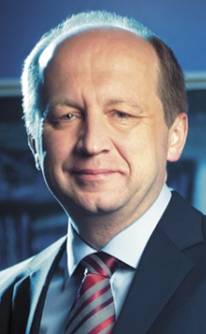
Prime Minister Andrius Kublius
The conservative party was good at controlling numbers, but failed to see people behind numbers
The conservative party was good at controlling numbers, but failed to see people behind numbers and didn't bother to communicate their decisions. And they did flirt with aggressive nationalism and anti-human rights groups.
It's damn expensive to run for elections. I know it from friends who have tried. Eventually people have to eitger join one of the existing 'mafia' or quit politics. With only popular backing and no business interest paying the bills, it's nearly impossible to gain visibility.
Daiva Repeckaite
- Bookmark :
- Digg
- del.icio.us
- Stumbleupon
- Redit it
- Posted by - (0) Comment
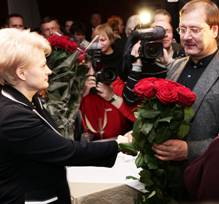
President Dalia Grybauskaite (left) openly supports the ruling coalition and has expressed doubts about the integrity of Viktor Uspaskich (right), the Russia-born Labor leader.
Lithuanians will cast ballots in the second-round of national elections Sunday in a tight race that could ultimately determine how quickly the small Baltic nation introduces the euro and whether it will build a new nuclear power plant.
Three parties across the political spectrum are hoping to emerge the winner following a close race in the first round two weeks ago. Opposition center-left parties that finished in first and second place have pledged to form a coalition that would increase social spending and postpone introducing the euro, while the ruling conservatives, who came in third, want to see Lithuania phase in the common currency in 2014 and proceed with plans to build a nuclear power plant, a plan the opposition has criticized.
The country of 3 million people saw one of Europe’s worst recessions and data show that, despite economic growth, living standards continue to decline due to soaring energy costs.
Nearly half of parliament’s 141 seats are up for grabs in Sunday’s run-off races. After the first round on Oct 14, the populist Labor Party, founded by a Russia-born millionaire, is in front with 18 seats — compared with 16 for its Social Democrat allies and 13 for its rival conservatives from Homeland Union-Lithuanian Christian Democrats.
The Labor Party and the Social Democrats, both in the current opposition, have agreed to form a coalition with another populist group, Order and Justice, which finished fifth with six seats. All three parties campaigned on higher wages and benefits and vowed to put off the euro until the European Union can resolve the three-year old economic crisis.
However, the ruling conservatives, led by Prime Minister Andrius Kubilius, could pull off an upset. The party has 35 candidates in second round ballots and leads in many of them.
If the Homeland Union were to end up with the most seats, they would likely get the nod from President Dalia Grybauskaite to form the next government, though analysts say a second-place finish might also be enough to keep Kubilius in the driver’s seat.
‘‘If Homeland Union finishes second after the run-off, this would be a major blow not only to the Labor Party but also the emerging three-party coalition. It would immediately weaken their positions in the new Parliament,’’ said Vladimiras Laucius, a political analyst at the Delfi news portal.
Read more...
- Bookmark :
- Digg
- del.icio.us
- Stumbleupon
- Redit it
- Posted by - (0) Comment
 Time to
Time to
leave
Lithuania?
By Aage Myhre, Editor-in-Chief
I asked this question in my editorial last week, referring to the massive migration that takes place from Lithuania these days. We talk no longer about emigration, but about evacuation.
I also ventured to express some criticism on how this country has been ruled for the past 22 years, as it is my conviction that the mass exodus is due to these years’ mismanagement and inadequate facilitation for new jobs, new investments and new businesses.
I forgot, by the way, mentioning rule of law and system critical press as key ingredients for a country that wants progress. In these two areas Lithuania is still an undeveloped nation.
I used myself as an example. That was perhaps a mistake. What I wanted to convey was that foreigners who have come here to work or develop business do not feel particularly welcome. I also wanted to say that the same largely applies to the country’s own population, not least to all those who are now 'fleeing' from here, looking for a new and better country to live in.
Let me also stress that I myself will never leave Lithuania as such. A prominent Lithuanian-American once asked me why I do so much for Lithuania, although I do not have my roots here. My response was that 'I have my branches here, and branches are as important as roots'. I obviously was referring to my two children, who I hope one day will feel real pride being 50% Lithuanian. Because the downturn of this country will not continue forever. One day the negative trend will reverse.
Let me also state that VilNews will continue and increasingly evolve as an important link between Lithuanians and their homeland. More and more people are reading VilNews, more and more writing for us or contributing in other ways.
I think such a common communication platform will prove important in the 'reconstruction' of Lithuania as a nation, and of 'all Lithuanian' as a common, strong bond between all of us with Lithuania in our hearts.
Click HERE to read my last week editorial…
-------------------------------------------------------------------------------------------------
Here a few of the comments we have received:
 Gaila Mucen, Australia |
Maybe the Government will listen and start doing something when even westerners who wanted to build a thriving Lithuania start leaving Your thoughts reflect the sentiments of other foreigners who came to Lithuania with big expectations of what a great country it could be but the situation today is a far cry from these expectations. Read more… |
 Lars M. Hansen, Denmark/ Lithuania |
Our love and hate relation to the lovely place called Lithuania Very well described, the love and hate relation to the lovely place called Lithuania. With so many opportunities and still with such grim prospects of the future. I say STAY. And not let the negative, departing nor disillusioned part of population decide which way their country will go… Read more… |
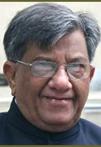 Rajinder Chaudhary, India/Lithuania |
Let us sail together and if at all sink – then sink together Aage, Most of all feel much the same way for our dear Lithuania as we all came here not only to do something for ourselves but for this country too. I can say with confidence that things have improved but the impact is hardly felt. The Outflow of the young manpower who are the future of this country is a very worrying factor… Read more… |
 Kestutis Eidukonis, Arizona/Lithuania |
What this country needs is a Leader who believes in Lithuania It is always darkest before the storm. Being close to the problems is difficult. But we cannot give up! We cannot be quitters. The fight must go on. Lithuanian partisans gave their lives for their country, countless thousands of Lithuanians suffered in Gulags. Others suffered the loss of their country for years. The "Soviet" apparatus is very good… Read more… |
 Irene Simanavicius, Toronto, Canada |
If you wanted to create a ruckus or take a stand, then moving to Lithuania was probably not your best choice Moving to a foreign country is one of the biggest life transitions you can ever make. While it can be challenging and fraught with paperwork, it can also be an immensely rewarding and enriching experience. Whether the move is for business purposes or for personal reasons. Read more… |
- Bookmark :
- Digg
- del.icio.us
- Stumbleupon
- Redit it
VilNews e-magazine is published in Vilnius, Lithuania. Editor-in-Chief: Mr. Aage Myhre. Inquires to the editors: editor@VilNews.com.
Code of Ethics: See Section 2 – about VilNews. VilNews is not responsible for content on external links/web pages.
HOW TO ADVERTISE IN VILNEWS.
All content is copyrighted © 2011. UAB ‘VilNews’.

 Click on the buttons to open and read each of VilNews' 18 sub-sections
Click on the buttons to open and read each of VilNews' 18 sub-sections 


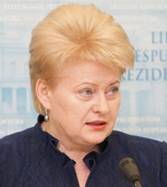


















.jpg)



